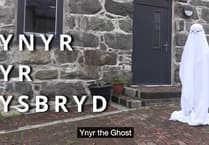According to contemporaries, Dvořák’s personality and his works were interchangeable, in which case he must have been a congenial person to know.
Few who heard his E flat String Quintet Op 97 in Coleg Meirion-Dwyfor on Friday, 3 February for Dolgellau Music Club's latest concert would doubt this: the ravishing performance given by Manchester’s Victoria Quartet (with Catherine Yates the added viola), their rich string sounds exploiting to the full the composer’s generous stream of memorable tunes and driving rhythms, had the audience leave in very high spirits indeed.
The concert’s first half made perfect preparation for this. It is said that Mozart composed his C major String Quintet K515 of 1787 not for a patron, but for his own enjoyment; here too high spirits predominate. Instruments converse freely with each other, and in the final movement the five have been compared to the ‘happily chattering cast of a comic opera’. Earlier on there are moments of dreamy romanticism anticipating Schubert.
Leader Benedict Holland provided all the Mozartian sparkle required, and Kimi Makini’s viola had a distinctive tone that added character to her part in the conversations. Cellist Jennifer Langridge gave finely judged support at all times.
The first half of the programme ended with Iain Farrington’s arrangement of Six Fragments for String Quartet by Elgar.
All five instruments are given moments of prominence in the Dvořák quintet, not least the second violin played here with vim and warmth by David Greed. His tone matched beautifully that of the two violas.
The E flat Quintet is suffused with the Czech composer’s yearning for his native Bohemia, a nostalgic mix that moved its first audience deeply in New York, January 1894. The imaginative intensity of this team’s performance in Dolgellau, February 2023 had an effect no less profound.
Are you a member of a group in your community? Do you have news, photos and videos of your latest activities to share? Send them to [email protected]





Comments
This article has no comments yet. Be the first to leave a comment.